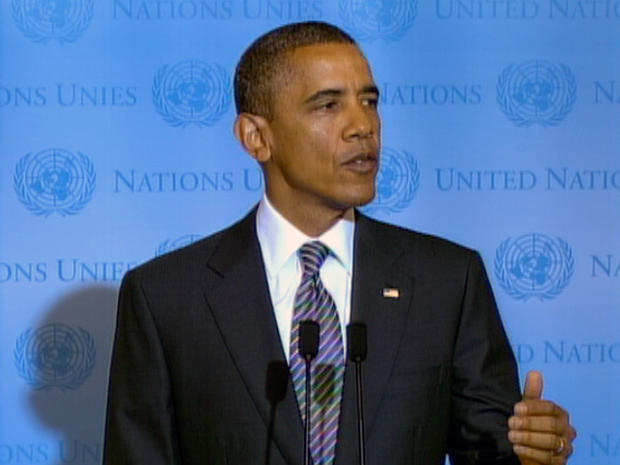President Obama in the hot seat at the U.N.
In his speech to the U.N. General Assembly on Wednesday, President Obama is set to focus on the "transformational nature of the past year," the White House said, meaning the transitions to democracy around the world since he was the at General Assembly a year ago. He has a tough audience to calm, both at home and with world leaders. Dominating the agenda this year have been the Palestinian statehood issue and the intense negotiations to restart Middle East peace talks.
There is a sense of urgency at U.N. headquarters in New York. Meetings about terrorism, nuclear safety, and the impact of an economic downturn on poor nations have packed the agenda, but as the clock ticks toward Friday with the expectation of a formal application for statehood at the U.N. by the Palestinians, world leaders are hoping to hear a way out of a high stakes confrontation.
Obama is expected to focus instead on the positive, the changes of government from despots to democratic leaders and the continuing battles in the Middle East and Northern Africa in what has come to be called the "Arab Spring," in Egypt, Tunisia and Libya -- and to spotlight the need for change in Syria and Iran.
Complete coverage: Anger in the Arab World
Libya will be part of the positive message and here Obama can speak from the heart about the difficult decision to support the NATO-led operation to protect civilians and how remarkable it is to have the rebel flag, the one representing the Transitional National Council, flying over the U.N., as he meets with the new leaders. There is no Muammar Qaddafi at this year's General Assembly, he will be able to say as a point of pride and that Libya is now represented by the chairman of the Libyan Transitional National Council, Mustafa Abdel Jalil, who was at the U.N. to discuss the reconstruction and development of a new Libya.
At the meeting of the "Open Government Partnership" on Tuesday, Obama said, "One year ago, at the U.N. General Assembly, I stated a simple truth -- that the strongest foundation for human progress lies in open economies, open societies, and open governments."
And, sending a message on the Palestinian issue, President Obama is expected to point to the world's newest nation, South Sudan, as an example of what can be the result of successful negotiations with warring parties, with the support of the international community.
U.N. "bust-up" over Palestinian statehood nears
Intense talks ongoing over Palestinian statehood
The president knows that he will be speaking to world leaders at a time when the U.S. Congress is looking to tighten the purse strings of the United Nations and he must make a case for engagement and multilateral efforts to a U.S. public. Obama will discuss how his administration, in the words of a White House backgrounder on the work at the U.N., "dramatically changed America's course at the United Nations to advance our interests and values" and "repaired frayed relations with countries around the world" ending American isolation, through engagement.
Because he is making the case for his foreign policy legacy, President Obama will discuss his administration's achievements, including: reforming the U.N. Human Rights Council and promoting transparency around the world. He is expected to underscore that from Mexico to Turkey to Liberia, nations have passed laws guaranteeing citizens the right to information and civil society groups have grown to combat corruption. He is expected to reflect on his meeting with Afghanistan's President Hamid Karzai and the rocky road that Afghanistan still has to face with the suicide attack and death of Burhanuddin Rabbani, the former president and chairman of the Afghan Peace Council.
Obama is expected to point to U.S. leadership in nuclear non-proliferation, the sanctions programs on Iran and North Korea and point to progress in Afghanistan and Iraq and in protecting civilians in Libya as well as the U.S. and U.N. efforts to provide emergency assistance for the famine in the Horn of Africa, in Ethiopia, Kenya and Somalia and the international assistance to Haiti.
But in the end, because of its urgency and because of the implications of a failure to calm the waters, Obama will be judged on the leadership he is able to muster on Israel and Palestine. World leaders will be listening for guidance in his address on Wednesday.
And, in the days after Obama's address, the international community will be watching to see if his administration, along with several European nations, are able to reduce tensions and take the Palestinian statehood tinderbox from confrontation to negotiations. They will be looking to see if the actions in the corridors and in back channels of the U.N. this week -- including the effort by allies and Middle East envoys to convince nations to not bring the Palestinian statehood issue to a vote at the Security Council -- were able to avoid a U.S. veto and, perhaps, help allow the peace talks to restart.
The fact that Obama has meetings with both Palestinian President Mahmoud Abbas and Israeli Prime Minister Benjamin Netanyahu is a good sign that a deal may be in the works.

